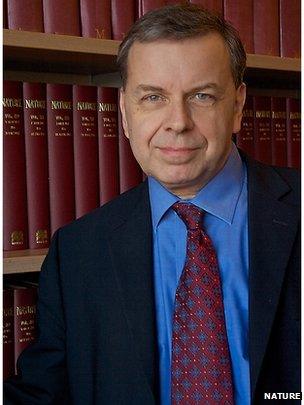H5N1 research censorship 'problematic'
- Published

Dr Philip Campbell, Editor in Chief of Nature. Censoring research is problematic
The editor of the world-leading scientific journal Nature says current procedures to assess and censor medical research potentially of use to terrorists need to be improved.
<link> <caption>Dr Philip Campbell</caption> <url href="http://www.nature.com/nature/journal/v485/n7396/full/485005a.html" platform="highweb"/> </link> made his remarks to BBC News following <link> <caption>the publication of controversial research into the bird flu virus H5N1</caption> <url href="http://www.nature.com/nature/journal/vaop/ncurrent/full/nature10831.html" platform="highweb"/> </link> .
Two research papers have raised the concern of anti-terrorist agencies.
One was submitted to Nature; the other to another leading journal, Science.
The Science paper has yet to appear.
Both pieces of research show that the H5N1 virus can relatively easily mutate into a form that might spread rapidly among the human population.
The studies had prompted the US National Security Advisory Board for Biotechnology (NSABB) to ask both journals last November to take out some sensitive parts of the research that it believed could be used by terrorists to develop a bio-weapon.
Many in the scientific community, including the researchers concerned, argued that the benefits of publishing the research in full outweighed the risks.
The purpose of the work was to help those trying to develop a vaccine against the virus and to track the spread of the disease. Many also considered it a breach of academic freedom.
The NSABB urged that a way be found to make deleted material available to legitimate researchers.
Discussions mediated by the World Health Organization earlier this year, however, concluded that there was no practical way of doing this, at least on a reasonable timescale, and so both Journals decided to publish the research.
Speaking for the first time on the issue, Dr Campbell said that the current process for establishing whether medical research should be censored was "very, very problematic".
"If we are to go down the censorship route, how do you decide which researchers should get the sensitive information? And how can you realistically ensure that once it is in a university environment that it won't go further?"
He also believes that the NSABB was too hasty to recommend censorship of the research.
"The process was too closed. People were having conversations only by phone and there was insufficient consultation of the researchers and of other experts," Dr Campbell told me.
So what's the best way to handle such a situation if it ever crops up again?
Dr Campbell believes that the NSABB and the WHO should continue to play an important role, but also he says that it's the responsibility of journal editors such as himself to consult the views of the community and the security agencies.
"We have access to the very best advice in such circumstances. I would also be willing to consider a more formal and collective process," he said.
"I can't readily conceive of how that might work in practice, but I'm happy to do anything that makes science more trusted where dangerous organisms are concerned."
Follow Pallab <link> <caption>on Twitter</caption> <url href="http://twitter.com/#!/@bbcpallab" platform="highweb"/> </link>
- Published2 April 2012
- Published31 March 2012
- Published17 February 2012
- Published31 January 2012
- Published20 January 2012
- Published21 December 2011
- Published20 December 2011
- Published30 August 2011